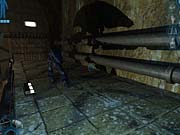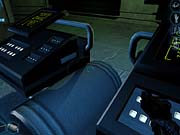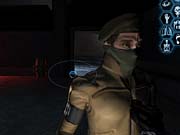DX2: The Invisible War Q&A
Ion Storm's Harvey Smith sits down with us to discuss the progress of this highly anticipated role-playing game.
The last time we checked in with antiterrorist agent J.C. Denton, the hero of the original Deus Ex, he was pounding the streets of a futuristic metropolis, working on a top-secret investigation that led to some pretty bizarre results. In the course of his travels, J.C. not only tangled with lowlife thugs and the Mafia, but he also unearthed elements of just about every conspiracy theory in the book--government cover-ups, UFO sightings, secret societies, and more. Fortunately for J.C., he was well equipped for the job, since he was part of a new breed of special agent, a highly trained human whose body was attuned to accepting mechanical implants called "biomods" that could make him stealthier, faster, and a deadlier marksman with Deus Ex's arsenal of futuristic weapons. One of the most intriguing things about the game was how much freedom it gave you--freedom to not only choose which implants you wanted J.C. to wear, but also in how you wanted to interact with the game's different characters. For instance, whenever J.C. met characters who didn't appreciate him snooping around, he often had the option to talk his way past them, sneak around them, or just draw a bead on them and blast them to smithereens. Deus Ex received much acclaim for the way it combined the action of a first-person shooter, the dialogue and character interaction of a traditional adventure game, and the character development of a role-playing game.

And now, 20 years have passed in the world of Deus Ex, and J.C. has stepped out of the limelight. But don't worry--he and his brother, Paul Denton (a prominent character from the original game), are both still around, and they'll be working with the sequel's new main character. In DX2: The Invisible War, you'll play as Alex (a male or female character), a new operative with a new mission. And though DX2 is still quite a ways off, we've already had a chance to see at least some part of the game in motion--for instance, we've seen demonstrations of DX2's new physics engine and its impressive handling of animated shadows, which move and deform realistically in real time. But will these new features be anything more than a fresh coat of paint? What sort of new options will players have in DX2? And who is Alex, anyway? We gave designer Harvey Smith the third degree about this upcoming sequel.
GameSpot: Thanks for taking the time for this interview, Harvey. You've been at Ion Storm for a long time now. What exactly is your role in the development of DX2: The Invisible War?
Harvey Smith: I'm the project director and lead designer for the game.
GS: The original Deus Ex took place in a futuristic world where conspiracy theories were true and secret societies like the Illuminati really existed. Since the sequel takes place about 20 years after the original game, how will this world have changed?
HS: The world has been influenced by the events from the first game. Beyond that, we're not saying much at this time. A lot of people have asked which endgame we've decided to [use as the basis for the] sequel, since Deus Ex ends with three different endgame possibilities. We're not really talking about that yet, but we have interesting plans.
A New Beginning
GS: We were certainly surprised when we heard that players would no longer play as agent J.C. Denton from the original game. Could you explain why you chose to change the main character?

HS: We wanted to keep J.C. alive as a significant fictional character in the DX world. Since DX2 is an RPG, we wanted the benefits of starting the player with a "low level" character--this allows players to pick and choose their character's powers as they advance through the game. J.C., obviously, would have started with a bunch of biomods and skills from Deus Ex. Lastly, we wanted to give the player the option of choosing a female character. Alex D., the new player character, can be male or female.
GS: So, even if we won't be able to play as J.C. Denton or his brother, Paul, can you discuss what sort of part they'll play in DX2? Can you name some of the other characters from Deus Ex who will return? What will their roles be?
HS: Both play significant roles. J.C. will end up as a mentor or as an adversary, depending on how you play. Tracer Tong is back to lecture you some more. And you get to see Nicolette DuClare, all grown up.
GS: It's already been made clear that the sequel will try to do a better job of not forcing players into direct fights. Can you discuss some of the enhancements you'll be adding to things like stealth and diplomacy? Will the sequel have any new ways to resolve conflict?
HS: We're spending a lot more time on the AI. Paul Tozour (interacting with other AI-experienced Ion people, like Doug Church) is putting together an overarching AI system that works for DX2 and Thief 3. Also, Brian Sharp is writing a custom sound-propagation model for the games. In DX2, if you go into an office to loot it, and you close the door at your back, the sounds you make in the office will be muffled by the door. In addition to these wholesale systemic changes, we're tweaking out a lot of the biomod powers so they allow the player to sneak, exploit the AI, and so forth.
GS: Even though the sequel will try to give players more options when it comes to avoiding conflict, what sorts of options will players have if they actually want to pick fights? Can you discuss the improvements and additions we can expect to see to the combat system?

HS: DX2's AI, combat model, weapons, animations, and biomods are completely new. (Even old versions of Deus Ex weapons and nanotech biomods are being revised from a game design standpoint and are being rewritten from a code standpoint.) We've learned a lot about how to make combat more visceral. As with the first game, we track body location damage, so head shots are more lethal. We now rag-doll bodies upon death, so corpses will flip-flop all over the place, tumbling squidlike down stairs or falling and hanging limply over railings. All the weapons in DX2 have alternate-fire modes, and we've tried to make all of these tactically interesting. For instance, you can still stick proximity mines to the wall, which plants the mine and leaves it in radius-trigger mode. (If an enemy approaches, it detonates.) But now you can also attach a prox mine to the wall in alternate-fire mode, which counts down from [a certain amount of time] before detonating.
GS: At E3, we had a chance to see the impressive lighting and shadows that DX2's brand-new graphics engine can produce. Can you discuss how the use of lighting will factor into the actual gameplay?
HS: Our completely dynamic, volumetric shadows will be super useful for stealth play. If players use their strength biomod to move a 300-pound barrel in front of a strong light source, they can actually then hide in the shadow. The AI's perception models are totally dynamic and completely based on sight and sound.
GS: We also had a chance to see DX2's use of the Havok physics engine in action--specifically, how bullets glance off different objects, like barrels, and can move objects realistically. Could you discuss how the sequel's enhanced physics will affect the way it plays?
HS: We're still wrestling with this. Physics system interaction alone is not fun. You have to carefully choose which elements to simulate realistically. Basically, we only want to model behaviors if they are fun for the player.
GS: The last time we spoke, we weren't able to get any details from you about the game's story. Can you share some details of DX2's story with us now? Who exactly is DX2's protagonist, and what role will he or she play in the game?
HS: The player-character, Alex D., is "related" to JC and Paul. (Alex's name appears in Deus Ex, in Area 51.) Alex was about five years old during the events of the first game and was primarily raised in Chicago. The character is fairly mutable, since the player will be able to dictate Alex's gender, skin/hair color, and nanotech enhancements.
GS: Finally, is there anything else you'd like to add about DX2?
HS: DX2 is very much the sequel to Deus Ex. We're trying to preserve all the immersive, atmospheric aspects of the game. But we're also getting really ambitious with regard to taking it up to the next notch. Technologically, I'm superexcited about our volumetric shadows and hi-fi physics system, and--specifically--the ramifications these have on Deus Ex-style gameplay. I think our AI is going to make the environments vastly more interesting. And I think we're finally getting the chance to fix all the little design things we didn't have time to fix last time. We're shooting for a really rich world.
GS: And we're looking forward to it. Thanks, Harvey.
Got a news tip or want to contact us directly? Email news@gamespot.com
Join the conversation